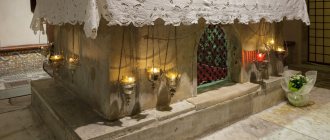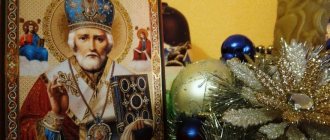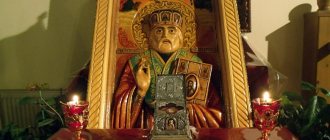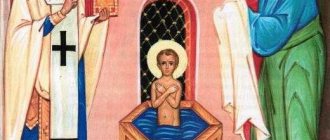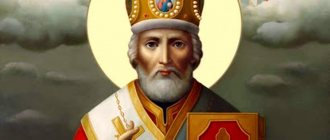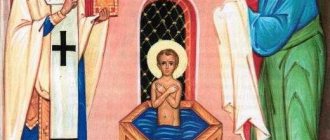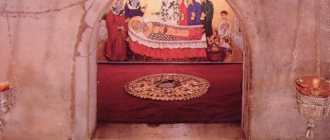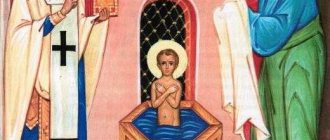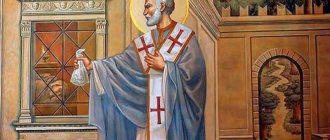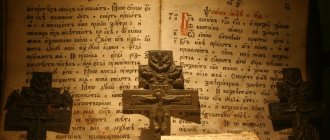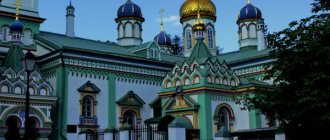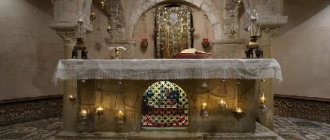St. Nicholas Day
The holiday of St. Nicholas the Wonderworker in the Orthodox Church is celebrated three times a year. These are December 19, May 22 and August 11 (new style). The first date is the day of repose, that is, the death of the saint. August 11 marks the birth of St. Nicholas the Wonderworker. May 22 is the day of the arrival of the relics of St. Nicholas the Wonderworker in the city of Bari (Italy).
In the 11th century, part of the relics was stolen from the city of Myra by Barian merchants. They brought the relics to their hometown, increasing its fame, prestige and trade volumes. The merchants' motives were mercantile, but the townspeople greeted the arriving relics with celebration and reverence. The transfer of the holy remains to the local church was accompanied by numerous healings of the sick.
The holiday of St. Nicholas the Wonderworker, dedicated to the transfer of relics, is celebrated in some countries, including Russia. The relics are still kept in this city, in the Basilica of St. Nicholas. Another part of the relics of St. Nicholas the Wonderworker was later transferred to Venice.
Tomb of St. Nicholas the Wonderworker in Bari (Italy)
Nicholas the Wonderworker. According to popular beliefs, he brings gifts for Christmas, helps travelers and protects the disadvantaged. Somewhere his name is Santa Claus, somewhere Babbo Natale, somewhere Sinterklaas.
Nicholas the Wonderworker has never been to Russia, but in our country he is even more revered than in the Catholic world. This story is about the phenomenon of St. Nicholas in Russia, better known to us as Nicholas the Saint or simply the Wonderworker.
The film takes place in three countries. One of them is America. Because the world-famous Santa Claus is also Saint Nicholas. To put together the historical puzzle of the spiritual path of St. Nicholas, the film crew visited the national Santa Claus of the USA and Canada in New York. Continuing to unravel the mystery of St. Nicholas the Wonderworker, it is impossible to ignore the sailors. They are said to be a pious people. And Saint Nicholas has always been considered their patron. One of the film's scenes takes place on board the barque "Kruzenshtern" in Kaliningrad.
Several characters in the film live in another seaside city, Italian Bari. Here, in the Catholic basilica, the relics of St. Nicholas have been kept for almost a thousand years. And it was from here that in May 2022, part of the holy relics was sent to Russia. This was a turning point in the history of the entire Christian world. A special filming permit was obtained for the film. Our viewer will see unique footage that no one has filmed.
Having set off in the footsteps of Nikolai Ugodnik’s fame in Russia, the film crew will end up in Neftekamsk. Gyuzel Utyasheva was given a terrible diagnosis; it is impossible to give birth to a child with this condition. In desperation, on the advice of a friend, Guzel decided to turn to Saint Nicholas. Being a Muslim, it was her first time in the temple. How to pray? “Just ask the Wonderworker. From the heart..." they advised her. Exactly a month later, Guzel found out about her pregnancy.
Italians continue to ask one of the film's heroes - Archpriest Andrei Boytsov, rector of the church-metochion of St. Nicholas the Wonderworker in Bari - the same question: why did the Russians choose as their most important patron saint someone who had never been to Russia? They are surprised that Russians revere St. Nicholas more than the residents of Bari. The abbot believes that it was not the Russians who chose St. Nicholas the Wonderworker, but he who chose Russia. In this film, the authors will try to understand its phenomenon. Why is a Christian saint revered by both Muslims and Buddhists? And why is it close to almost everyone?
Taking part in the film:
Monsignor Francesco Cacucci - Archbishop of Bari (Italy) Francesco Introna - head of the operation to extract the relics of St. Nicholas Andrey Boytsov, rector of the church-monastery of St. Nicholas the Wonderworker in Bari (Italy) Mikhail Eremchenko - captain of the barque "Kruzenshtern" Nikolai Gavrilov - ex -Head of the Aviation Department of the Federal Security Service of the Russian Federation Timothy Connaghan is the national Santa Claus of the USA and Canada.
Life of St. Nicholas the Wonderworker
Nicholas the Pleasant is one of the most revered Christian saints. The holiday of St. Nicholas the Wonderworker is celebrated in many countries even by people far from the Church.
The saint was born around 270 in the city of Patara, in the Roman province of Lycia (modern Turkey). Nikolai was raised in a wealthy Christian family and from early childhood sought to know God. The boy diligently studied the Holy Scriptures and spent a lot of time in prayer. After the death of his father and mother, Saint Nicholas distributed his inheritance to the poor. According to one version, Nicholas went from a reader to a priest and bishop of the city of Myra. According to another, he became a bishop immediately from a layman, thanks to a miraculous sign.
The life of Saint Nicholas experienced one of the longest periods of persecution of Christians in the Roman Empire. This period lasted from 303 to 311. Then came a relatively safe time for Christians: their communities developed, the fight against paganism and heresies (distortions of the true doctrine) was waged. Bishop Nicholas also made a significant contribution to the development of Christianity. According to church tradition, he participated in the Ecumenical Council of 325. There he decisively denounced the heresy of Arianism, which did not recognize the consubstantiality of God the Father and God the Son.
Saint Nicholas died in the city of Myra around 345. After death, his body began to flow myrrh and became an object of pilgrimage. For Christians, Nicholas the Wonderworker is the patron saint of travelers, the slandered, prisoners and orphans. This image of the saint was formed on the basis of many good deeds and miracles he performed.
Acts and miracles of Nicholas the Wonderworker
Church tradition contains many amazing stories about St. Nicholas. For example, he helped collect a dowry for the three daughters of a ruined rich man. This allowed them to marry safely and thus avoid shame. After all, the desperate father intended to use the girls’ beauty for shameful earnings. Saint Nicholas secretly planted gold three times for each daughter. Twice he managed to return home undetected. But the third time, the girls’ father tracked them down, recognized his benefactor and, in gratitude, threw himself at his feet. The saint ordered not to tell anyone about his act.
In his youth, Saint Nicholas went to study in the city of Alexandria. During a sea voyage, he resurrected a sailor who had died from a fall from a height. On the way back, the saint saved another sailor.
One day, a rebellion broke out in one of the provinces of the empire, and Tsar Constantine I sent an army to suppress it. During the campaign, the soldiers had a camp near the city of Myra. Some warriors began to loot and oppress the local population, which led to unrest. Saint Nicholas found out about this, immediately went to the military leaders and convinced them to pacify the soldiers.
Saint Nicholas also saved three governors who were sentenced to death on the false accusation of envious people of plotting against the emperor. On the night before the execution, the condemned in prison prayed to St. Nicholas, with whom they were personally acquainted. Saint Nicholas appeared to the emperor in a dream and strictly ordered the release of the innocently convicted. The tsar freed the governor and through them gave gifts to St. Nicholas.
Saint Nicholas the Pleasant and Nicholas the Wonderworker
In the history of the Christian church there was another Saint Nicholas of Lycia, revered as a miracle worker. This is Saint Nicholas of Pinar, who lived in the 6th century. The similarity of the biographies and the short time interval between the periods of the lives of the saints led to the fact that in many lives these two personalities merged into one.
Therefore, for a long time it was believed that in Christianity there was only one saint, St. Nicholas the Wonderworker. Some details of the life of Nikolai Pinarsky (for example, the names of his parents and a visit to the Holy Land) are still attributed to Nikolai Ugodnik, who lived two centuries before him. It is worth noting that this confusion did not extend to the holiday of St. Nicholas the Wonderworker.
Even if it is a collective image, it is dear to the heart
And even the fact that the lives of the saints cannot be perceived as a historical document is not so important. “Lives in general are characterized by the migration of some plots from one to another,” says reader Kirill Aleksin. – There is a point of view that in the life of St. Nicholas, which we know, the biography of two saints is combined: Nicholas of Myra, whose memory we celebrate, and St. Nicholas from the city of Patras. So some of the acts attributed to Nicholas of Myra may, in fact, have been committed by another saint. But this shouldn’t cause us any embarrassment.”
According to Professor Alexander Kopirovsky, all these stories about St. Nicholas, dear to the hearts of the common man, indicate that this, albeit largely collective, image of a Christian is an image of a living person, who is in the thick of life, for whom the gospel ideal is not something something speculative, and something that he embodies in specific situations. This is the image of a people's defender, very dear to my heart.
“Nicholas of Myra is a saint to whom we pray in all sorts of everyday difficulties, and they visit us very often, in fact accompany us all our lives,” says reader Kirill Aleksin. “Therefore, in the ‘popular hierarchy of saints’ he really ends up very high.” According to the theologian, this is also manifested in how often the name Nikolai was given (and is still given) to children. And in terms of the number of St. Nicholas Temples - in Russia: there are a lot of them, as well as in the Christian East, in the eastern Mediterranean. All this shows us how a person who once lived a very, very long time ago can nevertheless leave a memory of himself precisely because of his kindness and responsiveness. People remember such things even after a person’s death. A living connection with him is preserved because, as we know, with God, everyone is alive.
Photo: Vyacheslav Prokofiev/TASS
Veneration of St. Nicholas in Rus'
St. Nicholas has been widely revered in Russia for many centuries. Until the beginning of the 20th century, babies in our country were most often named in honor of this saint. Temples and icons dedicated to St. Nicholas the Pleasant were second only to the Mother of God in number.
Saint Nicholas repeatedly defended and strengthened Rus' in difficult times. For example, during the siege of Mozhaisk by the Mongols, a wondrous sign happened: St. Nicholas appeared in the sky as the defender of the city and drove away the enemies. In honor of this wonderful event, an icon of St. Nicholas of Mozhaisk was painted, which became miraculous.
There is a legend about the appearance of the image of St. Nicholas to Prince Dmitry Donskoy on the eve of the Battle of Kulikovo. After the victory in the battle, the prince founded the Nikolaev Ugresh monastery on the site of the appearance of the icon. The wonderful image of St. Nicholas is kept there to this day.
The city of Nikolaev, founded at the end of the 18th century in the south of the Russian Empire, is named in honor of Nikolai Ugodnik. The city received its name after the victorious assault by Russian troops on the Turkish fortress of Ochakov. The assault took place in December 1788, on St. Nicholas Day.
There is an icon of St. Nicholas the Wonderworker in every church. Christians turn to this saint not only for help in salvation, but also in various everyday needs. For example, to resolve housing difficulties.
Prayer to Nicholas the Wonderworker
O our good shepherd and God-wise mentor, Saint Nicholas of Christ! Hear us sinners, praying to you and calling for your speedy intercession for help; see us weak, caught from everywhere, deprived of every good and darkened in mind from cowardice; Try, O servant of God, not to leave us in the captivity of sin, so that we may not joyfully become our enemies and not die in our evil deeds.
Pray for us, unworthy, to our Creator and Master, to whom you stand with disembodied faces: make our God merciful to us in this life and in the future, so that He will not reward us according to our deeds and the impurity of our hearts, but according to His goodness He will reward us . We trust in your intercession, we boast of your intercession, we call on your intercession for help, and falling to your most holy image, we ask for help: deliver us, servant of Christ, from the evils that come upon us, and tame the waves of passions and troubles that rise up against us, and for the sake of Your holy prayers will not overwhelm us and we will not wallow in the abyss of sin and in the mud of our passions. Pray to Saint Nicholas of Christ, Christ our God, that he may grant us a peaceful life and remission of sins, salvation and great mercy for our souls, now and ever and unto ages of ages.
"Ambulance", strangling Aria and Santa Claus (+VIDEO)
On the day of remembrance of St. Nicholas, Archbishop of Myra in Lycia, we are talking with Doctor of Church History, Professor of Sretensky Theological Seminary Alexei Ivanovich Sidorov about the life of this saint, about why the carnival image of the Wonderworker has taken hold in the West, and in Rus' St. Nicholas is still especially revered .
- Alexey Ivanovich, tell me, how could it happen that St. Nicholas, the great saint, called the “image of meekness,” struck Arius at the Church Council?
– You have to be very careful with your words. So we say “an image of meekness,” but what is meekness? Meekness and humility are not servility or human enslavement. These words have a completely different meaning. The holy fathers, for example, separated worldly sadness and sadness for God. One and the same word, but includes completely different semantic contexts. We talk about God that he is the most impassive being and at the same time we talk about the righteous wrath of God.
And this suppression is very clear: it is standing for the truth. Saint Nicholas defeated heresy. He is not only an example of meekness, but also a rule of faith.
How, for example, could St. Sergius of Radonezh bless Dmitry Donskoy for bloodshed, for battle? And even send your spiritual children to this battle. Why? Because it was standing for Rus', for the Motherland, and therefore for Orthodoxy, for the truth.
And for this reason, precisely as standing for the truth, Saint Nicholas allowed himself to do this. And then he was even removed from the bishopric for some time, almost put in prison, but soon his correctness was revealed. It was revealed to some of the fathers of the Council, they were given a vision that St. Nicholas was innocent.
It is impossible to evaluate the action of the saint - his behind-the-ear Aria - in the categories of human psychology. This is a completely different level. Ontologically different
So the saint’s actions cannot be assessed in the categories of human psychology. That, they say, he came up and hit someone properly. This is a completely different type, a different level. Ontologically even different. This is the spiritual level. And a completely different attitude towards the enemy of truth. This opponent is typically a demon-possessed person, possessed by pride, and carrying anti-Orthodox teachings.
Saint Nicholas saves drowning people
– Tell me, what would you single out as the most important thing in the life of St. Nicholas?
- He is an ambulance. This story is very touching, telling how the saint threw gold to three sisters. After all, the fate of people was being decided! And he put this money in, and something very serious changed in the sinful world. And the three girls did not end up, in modern terms, in a brothel. Into the abyss of sin. But it is unknown how their father would have survived this immersion of his daughters in sin; he may have died of grief. The saint saved him too. Kept me from sin.
The life of the saint is extraordinary, and always touches the soul.
The miracles of the saint are known to everyone. Do you remember how he saved a drowned baby? How the parents were killed: the baby drowned!.. Can you imagine what grief it was for them? It would seem that we, Orthodox Christians, should approach all sorrows wisely and spiritually. Everything is correct. But the death of your child, this innocent baby on whom so much hope was pinned, is a very difficult grief. Yes, in Russia there is a saying: “God gave, God took,” and some people treat the death of a child this way. But for others it's hard. And maybe the parents of that baby who fell into the water would not have survived this. The saint saved not only the child - he also saved his parents. This is very important.
And the life of the saint is amazing, there is a lot of deeply instructive stuff there.
– Alexey Ivanovich, St. Nicholas is revered by all Christians. But in the mass consciousness of the West, the fairy-tale image of Santa Claus has replaced the true, religious veneration of the Miracle Worker of Myra. How did this happen?
– I would correct you: I didn’t just push aside, I eclipsed. This is a very serious phenomenon. Here we are faced with a clear example of a well-known fact, about which everyone talks and writes a lot - the de-Christianization of the West.
In the days of our youth, as we say, European educated people were highly valued. The West, separated by the “Iron Curtain” in Soviet times, attracted us with its culture: ancient philosophy, German classics, Hermann Hesse... And then I began to notice, especially recently, a sharp change in my attitude towards the West, towards Europe. If earlier, when they said: “a European-educated person,” it sounded like praise, now it is understood as “European-educated.” But they don’t say: “a sodomized person” - because it sounds, to put it mildly, indecent.
Marble throne over the relics of St. Nicholas in the basilica crypt, Bari (Italy). Photo: A. Pospelov / Pravoslavie.Ru
Here it is, grace from the relics of St. Nicholas. But the West is no longer interested in this!
The de-Christianization of the West also affected the fate of St. Nicholas. After all, he is there, in Bari. I was there once and was very happy that I was present at the service at the relics of the saint. The grace there is extraordinary! And I’m thinking: how come they don’t feel this? Here it is, grace from the relics of St. Nicholas, and the West is no longer interested in this. And they got Santa Claus instead of St. Nicholas. Of course, there was the Reformation... quite a lot has been written about this too. During the Reformation, in scientific terms, there was a desacralization of this greatest saint. And it is especially noticeable in America: there St. Nicholas has turned into a kind of grandfather who is not averse to drinking and taking a walk, and is generally very handsome and good-natured. As far as I know, in America they have already forgotten what Christmas actually is. Many, at least. And this is a tragedy.
Yes, in the West there are wonderful, good people. I also have friends there among Catholics. They are very worried about this tragedy of de-Christianization, desacralization of the entire worldview in general. But these friendly relations of ours do not in the least affect our worldview: I understand their tragedy, but I also understand something else. Sometimes they say: “sister churches, we need... we are in the same boat...” Yes, we are not in the same boat! We are in different boats. Their boat is sinking and will sink. Apparently, she has no other choice. And if we attach our boat to that one, we will sink with it. Therefore, the fate of St. Nicholas is for us a model, a paradigm of what is happening now in the West.
– And in Rus', the image of St. Nicholas, on the contrary, is very revered.
– This is a well-known fact. And I was always amazed at how revered Nikola was. Wherever you go - St. Nicholas Church. Everywhere! Why do we, in Russia, have such reverence? Honestly, I find it difficult to explain this. For some reason, Saint Nicholas fell in love with Russia. This is the grace of God. He is an ambulance. He comes to us, he constantly protects us.
When we pray to the saints, they are here. But this is an extraordinary mystery, this is what the Greeks called μυστήριον - the amazing mystery of the presence of saints here. Why does the saint choose such and such land? Maybe because we and our ancestors especially loved him? Indeed, since ancient times, since ancient Rus', we have loved St. Nicholas. And a kind of synergy occurs. Our ancestors converted, we are converting. And he acts, he loves us, he takes care of us. And now we should pray more diligently to the saint. Times are coming hard and difficult. And Saint Nicholas can help us a lot, our beloved Russia, our Motherland.
Alexey Ivanovich Sidorov
– Could you tell us about some event in your life when St. Nicholas provided miraculous help?
“There was such an amazing incident with my youngest granddaughter. Several years ago, when she was still a girl. Let's go swimming. She swam far away, and some boy swam after her. He, as it turned out, did not know how to swim very well, and the current was quite fast. The boy began to drown. The granddaughter rushed to help - he grabbed onto her and hung on, but he, like a boy, was heavier... The granddaughter realized that she would also drown. And then she turned to St. Nicholas. She said: “It was just a miracle that we jumped out of the water!” Maybe because Nikolai Mokry saves drowned people and those traveling on water.
– Alexey Ivanovich, I would like to hear your wishes on the day of remembrance of St. Nicholas the Wonderworker.
I would wish everyone to pray, pray and pray. Because without prayers our affairs will be very bad
– The wish is simple. The famous leader of the proletariat said: “Study, study and study.” And I would like everyone to pray, pray and pray. Because without prayers our affairs will be very bad. I think that prayer has always saved and saves. And praying is work, great work. The Gospel says: The Kingdom of God is taken by force. And now the effort of prayer, in my opinion, is very, very important for us. So I would like to encourage everyone to pray.
